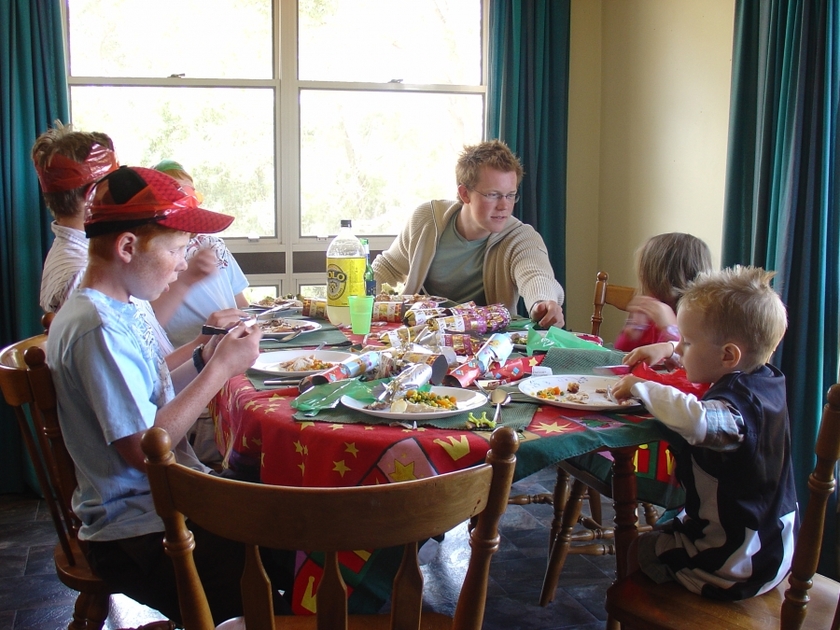
Dear Dr. T.,
I’m not sure this is a ‘parenting question’: more likely it’s a ‘parent’ question.
It’s my turn to go to my parents for yom tov and I truly look forward to spending time with my parents and sibs.
My issue is a very personal one. I very much want my children –ages 2 to 12- to be on their best behavior because we get together infrequently and this is my chance to share my nachas. Yet, what with the change in schedule and environment, my children generally find it hard to hold it together for eight whole days. By the last days of yom tov, my family presents at its very worst, and I look like I can’t cope.
Is there any way to make sure they behave?
Dr. T. Replies,
I would venture to guess that all my readers have been in this, or some similar, situation- at school, the park etc. There is no doubt that a child is his own little person- with a mind, and a will- of his own. I know of no magic to guarantee or force proper behavior, but there is much you can do to increase the likelihood of relatively smooth sailing. As always, the greatest predictor for success is the parent’s proactivity. What you do before yom tov is far more valuable than anything you can do when stuff happens. So, first and foremost, be mentally prepared to be busy with your children: entertaining them, taking them places, refereeing etc. Yom tov is unstructured time: lots of opportunity for mischief and fighting. Though many an adult looks forward to ‘returning to the womb,’ the responsibility for your children precludes that fantasy.
A good rule of thumb in being a proactive parent is to prepare the environment for the child and the child for the environment.
The Environment
Your parents’ home is the environment and the more your family [parents and siblings]
know about your child, the more comfortable your child will be. The idea that ‘no child gives more pain than he feels’ is crucial here. Happy children generally behave; uncomfortable children, for the most part, tell us about their discomfort, not with words, but with their behavior.
So, discuss with your family
-food preferences [children are picky eaters, despite your Mom’s great cooking]]
-eating schedule [some children may need to eat before Kiddush and/or before the seuda]
-sensory issues [does he not like to be touched or even have his chair touched]
-sleep habits [bed or crib? Nightlight? Routine?]
-activity level [ remove all tabletop items? Unable to sit thru a meal?]
-adaptability [easy, difficult, or slow to warm up?]
There are many other traits that make your child special and the more people know about him, the better they can deal with him. By preparing the environment, you are helping your family deal more effectively with your child and that usually results in a better behaved child.
The Child
Most of us, especially children, find new environments difficult to negotiate. Not only is the house different, but so is the yom tov schedule. Add to this the many new faces, often of different generations, and the change in diet, and it’s no wonder that many a child [and adult] feels out of sorts!
Talk to your child about
-new faces [even if he knows them, spending a week is a different matter]
-sleeping arrangement [where? With whom? Bedtime?]
-yom tov set-up [shul, seudos]
-food [new foods, yom tov traditionals]
Knowing what he can expect will help your child go with the flow and ease his discomfort with change. Your wise decision to prepare your child will save you and your family much grief.
To ease the transition, you may want to bring some of home along with you, particularly for the younger child or babies. Familiar items like blankets, favorite toys, sippee cups and the like go a long way to ease the transition. You might even consider bringing a favorite food, or preparing it in your parents’ home. The point of all this preparation is to minimize any possible negative reaction to change on your child’s part. In addition, achieving a level of comfort in his new surroundings should help keep your child on an even keel.
A child who has daas is capable of learning the rules of your parents’ home. Every family has its own set-up and style and knowing what’s ok or not ok is critical. Explain that though Mommy may have an entirely different set of rules, it is only fair to respect the rules of the host. So, choose a few rules that your parents really care about and are age-appropriate, and teach them to your child. Typically, items like‘eat only at the kitchen table’ or ‘play in the playroom when people are resting’ are positive steps in the right direction. Of course, depending on the child’s developmental level, you may need to help your child keep the rules. Though you may love to chat with your sibs, it may be necessary to sit at the table while the little ones eat or keep them company in the playroom.
Realistically speaking, despite all the preparation in the world, there probably will be some difficult moments. Some children have a more difficult nature, or are challenged by ADHD, a processing, or social issue. If a difficult situation arises, choose to leave the public domain and deal with the problem in a private place. Disciplining in public is a lose-lose position: the child is humiliated in front of others, you feel embarassed and powerless, and onlookers may become critical and ‘helpful.’ By removing yourself and the child, you spare everyone needless pain., especially your parents who worry about you. Knowing that you can make that face-saving choice should support you in the difficult moments.
Above all, develop realistic expectations. Children are not adults; they get angry, are impulsive, and find it hard to contain their frustration. Learn to let go; children are not perfect. Ignore when possible; not every behavior is worthy of comment. An outburst is simply a failure in communication, not a harbinger of a lifetime of bad midos. By understanding that we cannot expect adult behavior from a child, we lower the temperature and diffuse the situation. Hopefully, your choosing to underreact will have a calming, positive influence on the whole family and turn your yom tov into a win-win situation.
Best wishes for a chag kasher v’sameach.
Photo Attribution: http://www.everystockphoto.com/photo.php?imageId=1520208&searchId=b42f2fb21ffc6809debe22ce4e9d734c&npos=3
 Previous
Previous

